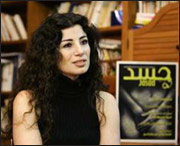 When Joumana Haddad launched the Arab-language erotic magazine, JASAD, over two years ago, the West hailed the Lebanese poet, translator and administrator of the 'Arab Booker' prize as the "Carrie Bradshaw of Beruit". Given the bags of hate mail she recieved after the first issue, not to mention the death threats and Hezbollah's attempt to close down her stand at the Beruit book fair, she might have found it a bit patronising to be referred to as a dusky-eyed shopaholic from Sex and the City.
When Joumana Haddad launched the Arab-language erotic magazine, JASAD, over two years ago, the West hailed the Lebanese poet, translator and administrator of the 'Arab Booker' prize as the "Carrie Bradshaw of Beruit". Given the bags of hate mail she recieved after the first issue, not to mention the death threats and Hezbollah's attempt to close down her stand at the Beruit book fair, she might have found it a bit patronising to be referred to as a dusky-eyed shopaholic from Sex and the City.
Talking to her this week, she shrugs off the "rather inaccurate" comparison (although she does admit to having a thing for shoes). However, she takes issue with the West's limited perception of the average Arab woman in her latest memoir cum polemic, I Killed Scheherazade. Gross sexual inequalities most certainly exist in religiously conservative Arab countries, she concurs, but "another model to the 'oppressed woman model' also exists that the West does not want to draw attention to, maybe because it doesn't sell as well as a story about a woman executed for losing her virginity."
Her book was written to fire a two-way sally East and Westwards after a particularly infuriating comment made by a foreign journalist who, commending Haddad, said: "Most of us in the West are not familiar with the possibility of liberated Arab women like you existing."
While the conservative strain in the Arab world may be strengthening - how else can we explain the campaign by a group of Egyptian lawyers seeking to delete 'salacious' passages of the cherished classic A Thousand and One Nights? - it is being robustly undercut by the likes of Haddad, and at their own peril (death threats appear almost par for the course).
Quoting a passage from the ancient text, The Perfumed Garden, in which the 15th century writer, Sheikh Nefwazi, offers such an explicit study of sexual intercourse that it would no doubt leave the Egyptian lawyers' red pen's quivering, she asks, mournfully: "How did we get from that early high point of liberty, of talking about sex so naturally, to our constipated present-day reality, I wonder?"
French feminist academics of North-African origin have, over past decades, been formulating ways of being that are Islamic and sexually liberated. Radically, a group of novelists are now writing intimately and subversively about the sex lives, loves and passions of Muslim women (and sometimes men too).
While Rajaa Alsanea, ruffled the feathers of Muslim hardliners with Girls of Riyadh, an unexpurgated account of the sex lives of young Saudi women who wear abayas (which was banned in her home country) Western readers seemed genuinely shocked by the idea that 'veiled' women were sexually voracious, and not the passive, burqa-clad victims we often imagine them to be.
Finding myself in Riyadh in 2005, shortly after the book was published, a group of teenagers said they felt the West's discussion on the (limited) freedoms of Arab women was stymied by a tunnel-eyed fixation with the veil.
An Algerian transsexual, Randa, has just published her memoirs of a childhood spent as a boy in Algeria. Leila Marouane, an award-winning Tunisian-born novelist, meanwhile, tackles the lustful desires of Arab men navigating the sexier side of culture clash in her recently published satire, The Sexual Life of an Islamist in Paris. She sends up her antihero, a handsome Parisian bank manager who, while appearing outwardly devout to his Algerian community, has 'Gallicised' his name and rented a swanky bachelor pad to prepare the ground for a libidinous, no-strings lifestyle. A womanising cousin even offers religious justification for this relentless pursuit of 'easy' white women; "In our religion, sex pleads not guilty, and so I'm allowed to copulate my fill here on earth, and beyond, inshallah, after my demise."
Haddad's amibition, that this body of work will lead to an opening of minds in the Middle East and also the West, is surely not too much to ask.
The Independent